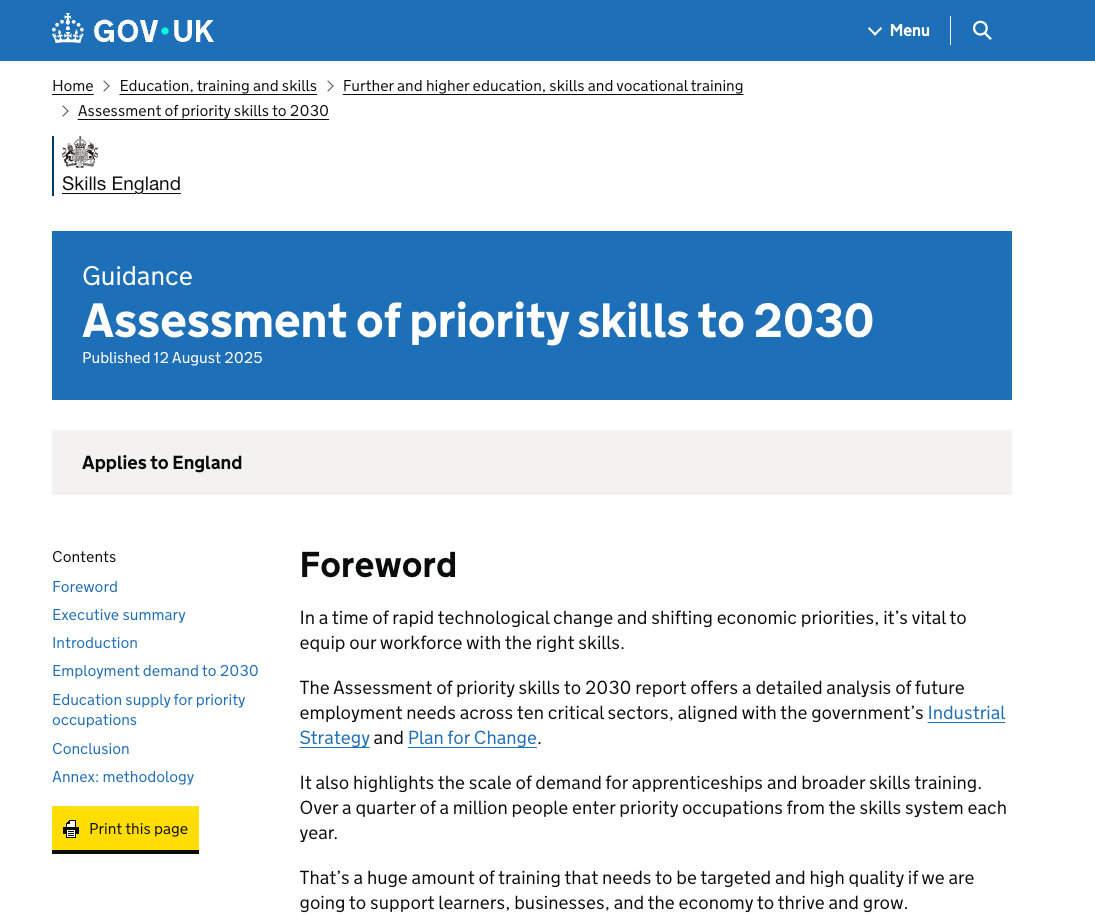
What SMEs should know from the new government skills report

4 mins read
By Crispin Read - 21st Aug 2025
The government's new Assessment of Priority Skills to 2030 is a chunky read — lots of tables, projections, and sector forecasts.
Here's what it really means for small businesses trying to stay competitive in a rapidly shifting skills landscape.
1. The AI-native advantage: A new kind of talent
The most striking finding isn't just that we need more developers – it's that we need a fundamentally different type of developer. The report highlights a growing demand for what bigger companies are calling "AI-native" talent. But here's what they're not telling you: this shift actually levels the playing field for smaller businesses.
That's people who are learning to code in an entirely new way — not bolting AI on as an assistant to old workflows, but growing up with AI in the core of how they work.
Think of it this way: traditional developers are like mechanics who've spent years mastering every part of an engine. AI-native developers are more like modern mechanics who know how to work with smart diagnostic systems and automated repairs. They might not know every nut and bolt, but they can solve problems faster and handle more complex systems.
For SMEs, this is actually good news. You don't need to compete with tech giants for expensive, experienced developers. Instead, you can build teams around these new-generation problem-solvers who can do more with less.
2. The myth of overqualification
The report breaks down future roles by qualification level, but here's the counter-intuitive truth: the most valuable employees won't be the ones with the highest qualifications, but those with the smartest mix of skills.
A PhD developer who can't explain technical concepts to your sales team might be less valuable than someone with lower qualifications but better commercial awareness. The report shows that one-third of new roles need relatively modest qualifications (Level 2-3) – but these roles often deliver the highest practical value.
In fact, stacking qualifications at different levels is one of the best ways to build adaptability. You don't need degree-level understanding of every skill you use in your job — but you do need the ability to pick up new skills quickly, in formats that are practical and immediately applicable.
Small businesses have an advantage here: you can build teams where people wear multiple hats and develop broad skill sets. The key is looking for people who can learn and adapt, not just those with the most impressive certificates.
3. AI as your competitive edge
The report is surprisingly candid about AI uncertainty, but here's what it misses: while big companies are stuck in lengthy AI strategy meetings, small businesses can experiment and adapt faster.
The data shows three clear opportunities for SMEs:
- Using AI to automate routine tasks that currently eat up your team's time
- Enhancing decision-making with AI-powered analysis
- Creating new services that combine human expertise with AI capabilities
The businesses seeing the best results aren't waiting for perfect solutions – they're starting small, testing what works, and scaling up gradually.
4. Quality over quantity: The SME advantage
The report's emphasis on training quality over quantity reveals an often-overlooked SME strength: the ability to provide focused, practical learning experiences. While larger companies roll out standardized training programs, smaller businesses can:
- Target specific skills gaps quickly
- Give people hands-on experience with new tools
- Measure impact in real business outcomes, not just completion rates
The key is choosing narrow, high-impact areas where improved skills directly affect your bottom line.
Final takeaway for SMEs
The report paints a challenging picture, but it's not all about resources and scale. The winners in this skills race won't be the biggest spenders, but the smartest adapters. For SMEs, that means:
- Hiring for potential over polish
- Building multi-skilled teams rather than specialists
- Using AI as a force multiplier for your existing talent
- Moving quickly while larger competitors are still planning
The skills gap isn't just a challenge – it's an opportunity to build more adaptable, future-ready businesses.





